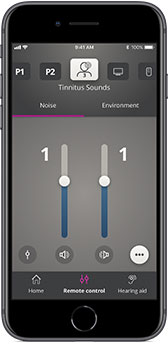Treating tinnitus with Tinnitus SoundSupport™

Oticon hearing aids with Tinnitus SoundSupport™ can help you take control of your tinnitus by playing a wide range of soothing relief sounds including ocean-like sounds and white noise.
Using an app, you can choose different sounds and adjust them until they give the relief you need. You can also stream your favorite music, audiobooks, podcasts, or even relaxation guides.
Book an appointment to demo our hearing aid models with tinnitus features. At Audika, we're also always here to help you tailor your hearing aids and sound therapy programs to suit your personal needs and preferences.
Consequences of untreated tinnitus
Some tinnitus sufferers become sensitive to places with constant talking or loud music, so they begin to avoid such social situations altogether. To others, it is so disturbing that a full night’s sleep can become difficult to achieve. Tinnitus, if left untreated, can lead to the following consequences:
- Anger
- Concentration problems
- Isolation
- Depression
- Sensitivity to places with constant talking or loud music
- Sleep disorder, insomnia
Some people are able to ignore their condition most of the time, but leaving it untreated can have a negative impact on your life if it is experienced over extended periods of time.
Understanding Pulsatile Tinnitus
Pulsatile tinnitus can be a sign of a serious medical condition, and anyone experiencing it should consult their healthcare professional.
It is a unique form of tinnitus characterized by rhythmic sounds resembling one's heartbeat, can be an unsettling experience. While relatively rare, this condition occurs due to various factors, often involving disruptions in blood flow around the ear and auditory system. At HearingLife, we are committed to providing comprehensive and effective strategies to help you reduce pulsatile tinnitus and experience long-term relief.
Exploring Relaxation Techniques for Reducing Pulsatile Tinnitus
In rare cases of pulsatile tinnitus, underlying issues related to blood flow and circulation may contribute to the condition. By integrating relaxation techniques into your daily routine, you can potentially alleviate symptoms and improve your overall well-being. These techniques work by promoting relaxation, reducing stress, and indirectly influencing blood flow patterns. Here are some relaxation techniques to consider:
Deep Breathing Exercises: Practicing deep breathing can help calm your nervous system, reducing stress and promoting healthy blood flow. Inhale deeply through your nose for a count of four, hold for a count of four, and exhale slowly through your mouth for a count of six. Repeat this several times, allowing your body to relax with each breath.
Progressive Muscle Relaxation: This technique involves holding and then gradually releasing different muscle groups in your body. Starting from your toes and moving up to your head, you'll release tension and promote relaxation throughout your body.
Meditation and Mindfulness: Engaging in meditation or mindfulness exercises can help you become more aware of your body and sensations. These practices can reduce stress and potentially improve blood flow over the long term.
Yoga and Tai Chi: These gentle forms of exercise combine movement, breath, and mindfulness, contributing to relaxation and improved circulation.
Long-Term Benefits of Relaxation Techniques
While relaxation techniques may not directly target the underlying causes of pulsatile tinnitus, they can play a significant role in managing the condition and promoting long-term relief. By reducing stress and promoting relaxation, you may experience a decrease in the intensity and frequency of pulsatile tinnitus episodes. Additionally, improved overall well-being and reduced stress levels can contribute to better blood flow and circulation, which may indirectly impact the condition.
Consulting a Professional
If you are experiencing pulsatile tinnitus, it's essential to consult a healthcare professional, such as an audiologist or an ear, nose, and throat specialist (ENT). They can conduct a thorough evaluation to identify any underlying causes and recommend appropriate treatment options. It's important to note that while relaxation techniques can be beneficial, they should be used in conjunction with medical guidance for optimal results.
Sound therapy can provide relief from ringing in the ears
Although sound therapy cannot eliminate this, it can be a helpful tool for managing the symptoms. With sound therapy, you listen to different, carefully selected sounds, which can help you feel that your tinnitus is reduced or temporarily gone.
It then becomes easier to hold your attention away from your condition. Plus, it helps you focus on something more pleasant. You can find the sound therapy that gives you the most effective relief from ringing in the ears by working together with your hearing care professional.
Sound therapy can be provided through:
Browse our selection of hearing aids that offer tinnitus features:





